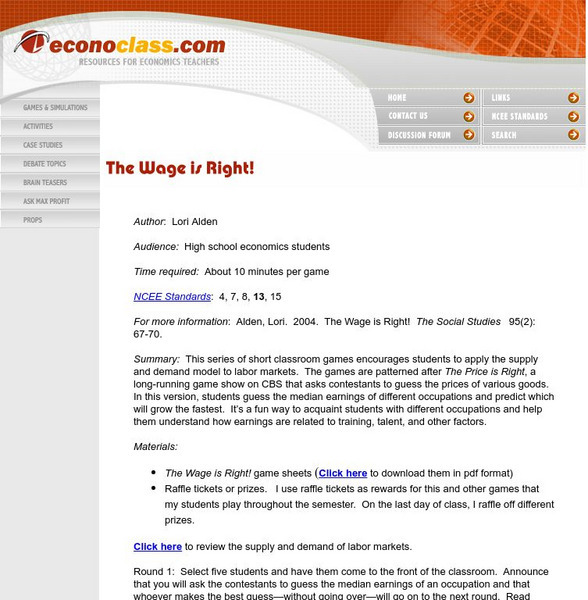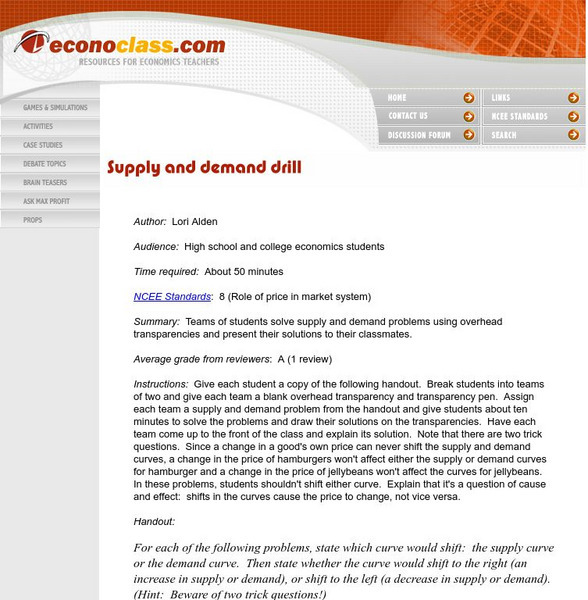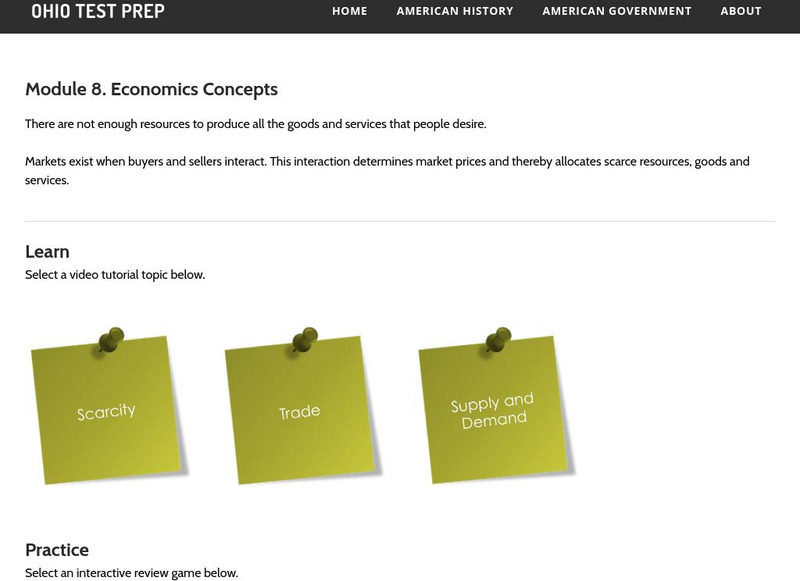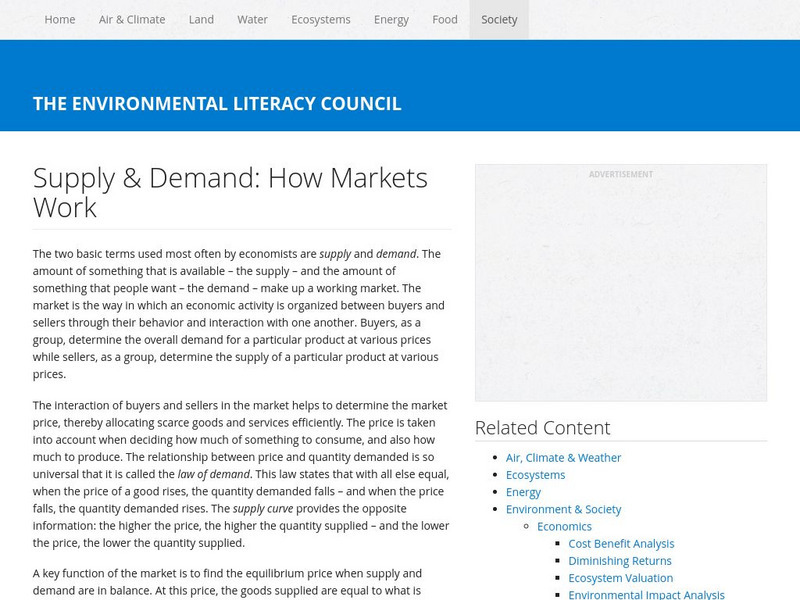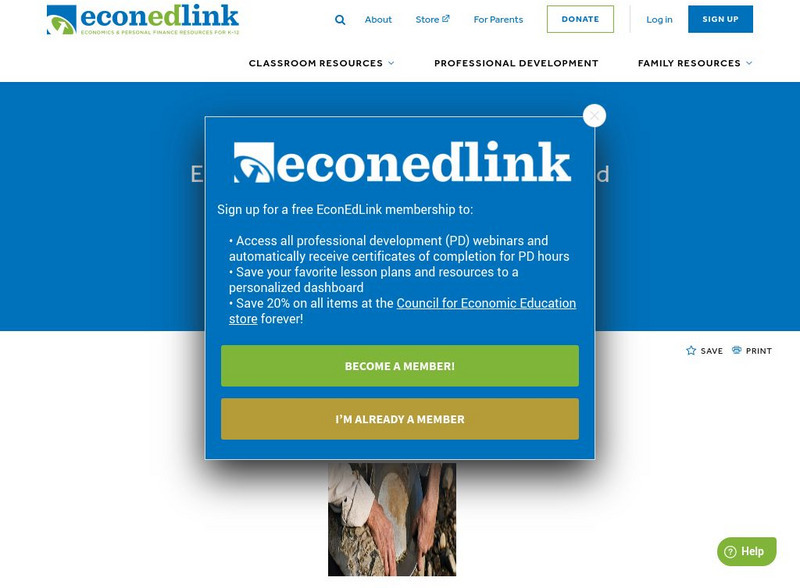University of Illinois
University of Illinois: Early American Trade With China: Fortune and Failures in Fur [Pdf]
One of the things economists do is to study the relationship between the supply of products being sold on the market, the demand for products by consumers, and the price of products. They look at how price is determined by the...
University of Illinois
University of Illinois: Early American Trade With China: American Ideas About Trade [Pdf]
American businessmen in the late 18th and 19th centuries were very interested in finding markets all over the world for their goods and actively pursuing opportunities for foreign trade. The young nation needed to earn money to pay back...
Council for Economic Education
Econ Ed Link: Marketplace: Iraq's Supply and Demand
In this lesson, students listen to an audio file about how the growing demand for workers in Iraq in May 2004 affected the job market, and how the effects of low growth in the supply of workers shaped companies' hiring practices and...
Council for Economic Education
Econ Ed Link: Marketplace: Price Increase or Price Gouging?
Students learn about price-gouging. Using a hypothetical post-disaster example, they will learn more about supply and demand, as well as the complexities associated with price increases in a supply-constrained market.
Other
Net Mba Business Knowledge Center: Supply and Demand
This website offers a very simple yet helpful description and example of the interaction of supply and demand, and what will happen to price and quantity when one or both of your supply and demand curves shift. This would be a good place...
Other
South Western Learning: Econ News: Comparative Statics: Perfect Competition
This site offers economics-based newspaper headlines and asks follow-up questions based on supply and demand in a perfectly competitive market.
Other
South Western Learning: Econ News: Perfect Competition
This site offers a variety of economics-related newspaper headlines in perfectly competitive markets, and each headline offers discussion questions related to that topic.
Econoclass
Econoclass: The Wage Is Right!
This classroom activity is based on the television show "The Price Is Right" and allows students to think about wage earnings in various sectors of employment. Could be used as a classroom activity when studying supply and demand or the...
Econoclass
Econoclass: Supply and Demand Drill
This classroom activity provides students with many examples of changes in supply or demand.
Econoclass
Econoclass: Resources for Economic Teachers
A site with resources for teachers teaching high school economics.
Other
Biz Kids: Bring Home the Bacon
Bring Home the Bacon is an exciting interactive way to learn the concept of supply and demand. More demand, more customers, but don't get too carried away because upgrading your investments might be worth the wait!
University of Nebraska Omaha
Ecedweb: Explorations in Economic Supply, Part I
Examines how supply relates to economic decision making. Using the example of purchasing blue jeans, students take the role of producer to determine how many blue jeans they would supply to the market. Includes links and discussion...
Alabama Learning Exchange
Alex: Producers and Consumers
This instructional activity will teach the difference between producers and consumers. It provides an interactive way for students to get involved and actually become producers and consumers.
Science Education Resource Center at Carleton College
Serc: Using Clickers to Generate Supply and Demand Curves
This lesson has young scholars using clickers to generate data for demand and supply curves. It asks students to give numerical values for their maximum willingness to pay for something and their minimum willingness to accept for...
Ohio Test Prep
Ohio Test Prep: Module 8: Economics Concepts
Ohio Test Prep on fundamental concepts teaches about supply and demand, scarcity, and trade. Includes video tutorials, interactive practice and review, and assessment.
The Environmental Literacy Council
Environmental Literacy Council: Supply and Demand: How Markets Work
An article on supply and demand and how markets work. Related links for teachers.
Council for Economic Education
Econ Ed Link: The Prices Are Changing
This lesson will help students to understand how markets are created by the interaction of buyers and sellers, what demand and supply are, what equilibrium price is, and how demand and supply interact with price changes.
Council for Economic Education
Econ Ed Link: How the Crusades Led to the Finding of the New World
The instructional activity will help learners to discover the importance of the Crusades to the expansion of many European countries. Students will also be introduced to new products and find out why explorers were willing to risk all to...
Council for Economic Education
Econ Ed Link: Economics in the Headlines
Learners learn how to identify headlines in the news and current events as illustrations of problems in supply and demand. Students will be linked to news sites to create their own analysis of supply and demand issues in problems facing...
Council for Economic Education
Econ Ed Link: Tapped Dry: How Do You Solve a Water Shortage?
Economists do not operate in a vacuum. If an economist is going to suggest that the price of a good needs to be increased, he or she needs to consider who will bear the increase in costs. Will the costs be distributed equally or will one...
Federal Reserve Bank
Federal Reserve Bank of St. Louis: What Is Driving Oil Prices?
As the world's demand for oil rapidly increases, so do the prices for it. Learn the factors causing high oil prices and who are the world's largest consumers of petroleum. Includes discussion questions. (Published Jan. 2005)
BBC
Bbc: Gcse Bitesize: Crude Oil, Hydrocarbons and Alkanes
Crude oil is a finite resource. Petrol and other fuels are produced from it using fractional distillation. Cracking is used to convert long alkanes into shorter, more useful hydrocarbons. Links are provided for a video and a test.
Council for Economic Education
Econ Ed Link: Economic Spotter: Supply and Demand at the Gold Rush
During the Gold Rush, people paid exorbitant prices for ordinary objects. Why? Because of the laws of supply and demand, that's why! In the instructional activity, learners will see how these laws fit into this great historical time.
Council for Economic Education
Econ Ed Link: What Is Competition?
Explore the world of competition in business through this informative lesson plan.


![University of Illinois: Early American Trade With China: Fortune and Failures in Fur [Pdf] Activity University of Illinois: Early American Trade With China: Fortune and Failures in Fur [Pdf] Activity](https://d15y2dacu3jp90.cloudfront.net/images/attachment_defaults/resource/large/FPO-knovation.png)



